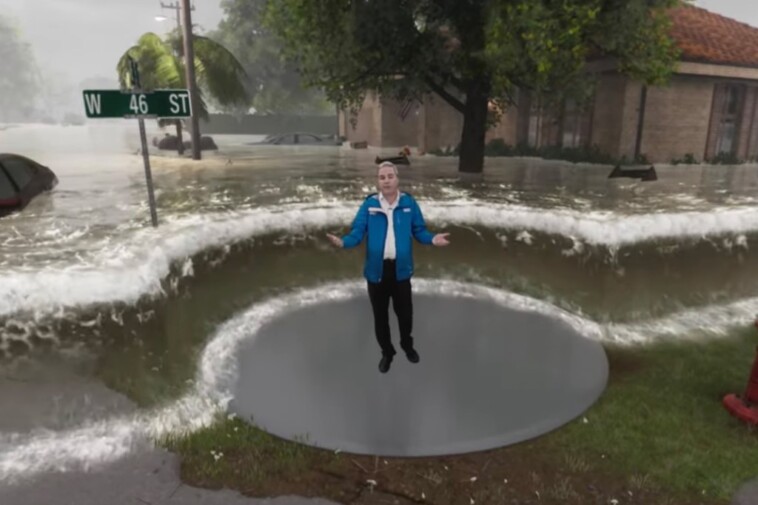Years-old Weather Channel videos are recirculating online ahead of Hurricane Milton’s landfall as the clips demonstrate the potentially devastating effects of the Category 5 hurricane.
The two videos provide 3D models of the damage that results from destructive winds and storm surges associated with powerful hurricanes.
Milton is expected to batter the Gulf Coast of Florida with winds of 160 mph and a storm surge of up to 15 feet — bringing possible once-in-a-century damage to western areas between Tampa and Sarasota.
Nearly six million Floridians have been ordered to evacuate or face possible death.
“If you choose to stay … you are going to die,” Tampa Mayor Jane Castor bluntly warned residents on CNN, adding that a “literally catastrophic” hurricane was barreling toward the Sunshine State.
Meteorologist Mark Elliot demonstrates how a house can be literally ripped apart by hurricane-force winds in a Weather Channel video from August 2013.
“When it comes to hurricanes, each ones’ impacts are a little bit different but the wind speeds that we talk about along the Saffir-Simpson scale, those are very specific and the damage caused in those categories [are] kind of predictable,” Elliot says in the 11-year-old clip.
He then walks through a 3D model of a house being impacted by increasingly fast winds of category 1 through 5 hurricanes.
A few of the house’s shingles are blown off in a Category 1 storm with winds blowing up to 95 mph. By a Category 4 storm, the powerful gusts knock down most trees and break nearly all windows and a Category 5 monster causes the roof of the house to be blown off and the walls to start to cave inwards.
“That’s just catastrophic damage, but again that’s just from the wind and there are other impacts from hurricanes and they all vary through the season,” Elliot says of the highest category storm impact.
The other Weather Channel video, from 2018 before Hurricane Florence hit the Carolina coast, shows how scary storm surge can be — even for areas inland.
Follow the latest from The Post on Hurricane Milton:
- Hurricane Milton live updates: Tracking monster storm’s path
- Hurricane Milton path shows Tampa, Florida, could still take direct hit from superstorm
- Tampa mayor issues dire warning before Hurricane Milton: ‘If you choose to stay … you are going to die’
- Milton threatens to reach max limits, sparking calls for a new Category 6 designation for hurricanes
- Florida meteorologist becomes emotional on air over Hurricane Milton’s staggering growth: ‘Just horrific’
The clip demonstrates through a 3D model of flood water what different levels of storm surge look like on a residential block.
One to three feet of water “certainly is enough to knock you off your feet,” the meteorologist says in the video.
“It can definitely stall cars out and even carry cars away and certainly flood many of the lower levels of structures.”
The video shows the modeled water rising to the level of a parked car’s window and causing trash and other items to float.
The water then rises to a height of six feet, above the forecaster’s head and reaches the bottom of a street sign as it carries the parked car up and away.
“Now, six feet of water — imagine that — that carries large objects in it like cars, for example, that can act like battering rams and enhance the damage that would otherwise be and also we know that can flood the lower levels of many structures,” he says.
The water continues to rise well above the forecaster’s head and the street sign and to the tops of the roofs of nearby homes—to nine feet, as predicted for Hurricane Florence at the time. Hurricane Milton is expected to bring storm surges six feet taller than that.
“That will totally cover up one-story buildings and structures leaving them underwater and certainly pose a risk to many,” he says. “There are very few places that are safe when the water rises this high so please follow the advice of your local officials and heed the evacuation warnings.”
Milton is expected to make landfall late Wednesday.








